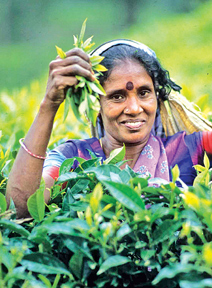|
Tea industry:
High production costs impact competitiveness - TEA
The tea export industry has achieved US$ 1.6 billion with an export
volume of 320 million kilos last year.
 Although the government’s effort to increase revenue from tea to US$
5 billion by 2020 is a challenging target under the current global tea
market, the Tea Exporters Association (TEA) has already developed
strategies to reach a year-on-year growth of 25% to achieve this target. Although the government’s effort to increase revenue from tea to US$
5 billion by 2020 is a challenging target under the current global tea
market, the Tea Exporters Association (TEA) has already developed
strategies to reach a year-on-year growth of 25% to achieve this target.
Even though tea exporters have empowered themselves to stand firm in
the industry, they had to tackle internal and external issues. The cost
of tea production in Sri Lanka has been recorded as the highest in the
world while workforce productivity remains low.
This is an area that deserves much focus as it directly impacts the
country’s competitiveness in the international market which will
inevitably lower Sri Lanka’s export revenue. The Association also
believes that all producers should consider re-planting as a large
number of tea bushes are old.
“The government has recognized the problem in the industry and has
taken into serious consideration the fact that human capital should be
valued and given top priority. The government has a plan based on
competitiveness, efficiency and productivity to make Sri Lanka the most
challenging economy in the global market place,” Deputy Minister of
Foreign Affairs, Dr. Harsha de Silva said.
The Tea Exporters’ Association (TEA) held its 16th Annual General
Meeting recently on the theme ‘Teanomics’. It focused mainly on all
potential and positive opportunities in the global tea industry.
The international market value of tea currently stands at US$ 90
billion (US$ 40 billion - hot tea, US$ 50 billion – iced tea). Fifty-two
percent of Sri Lanka’s tea is exported to the Middle East while 25% is
exported to Russia and the Commonwealth of Independent States combined.
But as Russia is under sanction and several of the Middle Eastern
countries are also under international sanctions with armed conflicts in
the region it has affected the market’s buying power.
Further compounding this issue, the Russian Ruble has depreciated by
100% while oil prices saw a 50% dip. Nevertheless, the Association’s
marketing strategies to promote value-addition globally remains strong.
Markets such as China and Turkey have a high demand for Ceylon tea
but has an unattainable tax imposed on them. For example, Turkey has a
145% duty imposed on tea, therefore, Sri Lanka should consider signing a
Free Trade Agreement (FTA) with Turkey and show more concern to exploit
such markets, a TEA offical said.
Chairman of the Calamander Group in Singapore, Roman Scott said, “Sri
Lanka should focus more on product innovation and current global trends
instead of the dying out value-addition model to get out of the current
crisis. Most exporters’ are focused on this model and are blinded by the
success of some of the local tea brands in the past through their
presence in the international market.”
“If companies do want to pursue this feat, the best method is to sell
to large retailers before launching a product of its own. At the same
time, Sri Lanka should move away from traditional markets in the Middle
East and Russia and cater to the rich Western markets which have
sophisticated consumers with buying power,” he said.
Chairman, Tea Exporters Association, Rohan Fernando said, “The
opportunities for tea in the global market come in many forms. I believe
that the way forward is by expanding our product and reach. While we
cannot ignore that most of the top global tea brands have had their
origins in Ceylon and, therefore, our tea exporters should take on the
world by diversifying into other segments of tea and secure the business
on branding and service excellence.”
Having recognized the potential for the industry, the TEA has
proposed a set of strategies that could be applied to increase
production and quality while reducing cost.
Market diversification of tea-based products such as cosmetics,
antioxidants, iced tea segments; improving the quality of tea, complying
with food safety standards along with research and development with the
support of the government have been identified as a few them. Developing
Sri Lanka as a tea hub is on the top of this year’s agenda as it is a
strategic move by the Association to expand production and control
imports at the duty free zone. With much hope of taking Sri Lanka to the
top of the global tea market as the number one supplier of branded
products, the Tea Exporters Association has called for support from the
Tea Board and government to achieve this vision.
- SJ |

